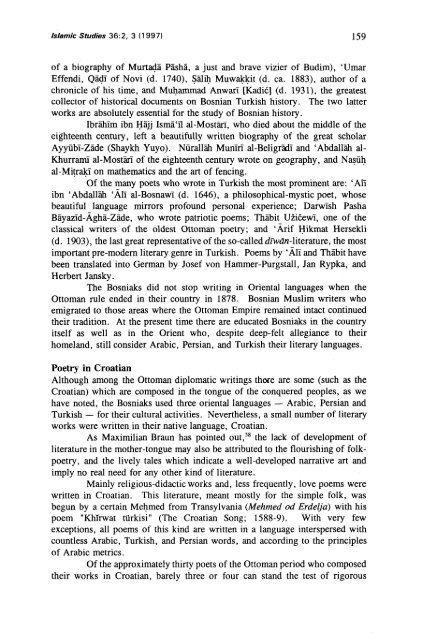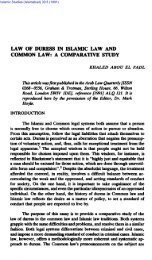Create successful ePaper yourself
Turn your PDF publications into a flip-book with our unique Google optimized e-Paper software.
Islamic Studies 3 6 : 2, 3 ( 1 9 9 7 159<br />
of a biography of Murta& Piishii, a just and brave vizier of Budim), 'Umar<br />
Effendi, Qiidi of Novi (d. 1740), S%l$ Muwait (d. ca. 1883), author of a<br />
chronicle of his time, and Muhammad Anwari [KadiC] (d. 193 I), the greatest<br />
collector of historical documents on Bosnian Turkish history. The two latter<br />
works are absolutely essential for the study of Bosnian history.<br />
Ibriihim ibn Hiijj Ismii'il al-Most;iri, who died about the middle of the<br />
eighteenth century, left a beautifully written biography of the great scholar<br />
Ayyiibi-Ziide (Shaykh Yuyo). Niirall* Muniri al-Beligrdi and 'Abdall* al-<br />
Khurrarni al-Mostai of the eighteenth century wrote on geography, and Nasiih<br />
al-Mitr&i on mathematics and the art of fencing.<br />
Of the many poets who wrote in Turkish the most prominent are: 'Ali<br />
ibn ' Abdall* 'Ali al-Bosnawi (d. 1646), a philosophical-mystic poet, whose<br />
beautiful language mirrors profound personal experience; Darwish Pasha<br />
~ii~azid-Aghii-~Sde, who wrote patriotic poems; ThSbit UiiEewi, one of the<br />
classical writers of the oldest Ottoman poetry; and 'Arif Ijikmat Hersekli<br />
(d. 1903), the last great representative of the so-called diwan-literature, the most<br />
important pre-modern literary genre in Turkish. Poems by '~li and Thiibit have<br />
been translated into German by Josef von Hammer-Purgstall, Jan Rypka, and<br />
Herbert Jansky .<br />
The Bosniaks did not stop writing in Oriental languages when the<br />
Ottoman rule ended in their country in 1878. Bosnian Muslim writers who<br />
emigrated to those areas where the Ottoman Empire remained intact continued<br />
their tradition. At the present time there are educated Bosniaks in the country<br />
itself as well as in the Orient who, despite deep-felt allegiance to their<br />
homeland, still consider Arabic, Persian, and Turkish their literary languages.<br />
Poetry in Croatian<br />
Although among the Ottoman diplomatic writings thsre are some (such as the<br />
Croatian) which are composed in the tongue of the conquered peoples, as we<br />
have noted, the Bosniaks used three oriental languages - Arabic, Persian and<br />
Turkish - for their cultural activities. Nevertheless, a small number of literary<br />
works were written in their native language, Croatian.<br />
As Maximilian Braun has pointed out," the lack of development of<br />
literature in the mother-tongue may also be attributed to the flourishing of folk-<br />
poetry, and the lively tales which indicate a well-developed narrative art and<br />
imply no real need for any other kind of literature.<br />
Mainly religious-didactic works and, less frequently, love poems were<br />
written in Croatian. This literature, meant mostly for the simple folk, was<br />
begun by a certain Mehmed from Transylvania (Mehmed od Erdelja) with his<br />
poem "Khirwat tiirkisi" (The Croatian Song; 1588-9). With very few<br />
exceptions, all poems of this kind are written in a language interspersed with<br />
countless Arabic, Turkish, and Persian words, and according to the principles<br />
of Arabic metrics.<br />
Of the approximately thirty poets of the Ottoman period who composed<br />
their works in Croatian, barely three or four can stand the test of rigorous
















